
- What is Tae Kwon Do?
- How Tae Kwon Do Helps Improve Symptoms of Parkinson's Disease
- The Physical Benefits of Tae Kwon Do for Parkinson's Disease
- The Mental and Emotional Benefits of Tae Kwon Do
- Real-Life Case Studies of Parkinson’s Patients Benefiting from Tae Kwon Do
- How to Get Started with Tae Kwon Do for Parkinson’s Disease
What is Tae Kwon Do?
Tae Kwon Do is a Korean martial art known for its focus on high, fast kicks, and dynamic footwork. It combines physical techniques with philosophical principles, promoting self-discipline, respect, and mental clarity. While traditionally used for self-defense and sport, Tae Kwon Do offers a wide range of health benefits, including improvements in flexibility, strength, and balance, making it especially beneficial for individuals with certain medical conditions, including Parkinson’s disease.
Parkinson’s disease, a neurodegenerative disorder that affects movement, causes symptoms such as tremors, stiffness, and difficulty with balance. Studies and anecdotal evidence suggest that martial arts, particularly Tae Kwon Do, can play a pivotal role in improving these symptoms and enhancing the quality of life for individuals with Parkinson's.

Motivate Martial Arts / motivate martial arts monroe ga
768 W Spring St, Monroe, GA 30655, USA
How Tae Kwon Do Helps Improve Symptoms of Parkinson's Disease
While there is no cure for Parkinson’s disease, physical exercise is considered one of the most effective treatments for managing its symptoms. Tae Kwon Do, with its emphasis on controlled movements, balance, and coordination, can provide significant benefits to Parkinson’s patients.
The rhythmic movements involved in Tae Kwon Do, such as punching, kicking, and blocking, can help improve motor function, posture, and muscle tone. Additionally, martial arts training often focuses on mindfulness and breathing techniques, which are crucial for reducing stress and improving mental well-being in people with Parkinson’s.
Many Parkinson’s patients experience a decrease in muscle rigidity and an improvement in their range of motion after engaging in Tae Kwon Do training. The martial art’s focus on balance and coordination helps reduce the risk of falls, a common concern for those with Parkinson's.

Gallegos jiu jitsu HQ / gallegos jiu jitsu
Chula VistaSan Diego CountyCalifornia
821 Kuhn Dr Suite #110, Chula Vista, CA 91914, USA
The Physical Benefits of Tae Kwon Do for Parkinson's Disease
One of the key reasons why Tae Kwon Do is beneficial for those with Parkinson's disease is its ability to address several physical challenges associated with the condition.
1. Improved Balance and Coordination
Parkinson’s disease can significantly impair balance, making it harder for individuals to perform everyday tasks or avoid falls. Tae Kwon Do’s training regimen incorporates balance drills, stances, and footwork that help strengthen the core muscles and improve coordination, making it easier for patients to maintain their stability.
2. Increased Flexibility
The dynamic movements of Tae Kwon Do, particularly the high kicks and leg stretches, promote greater flexibility in the joints and muscles. This is crucial for Parkinson’s patients who often suffer from muscle stiffness, as increased flexibility can alleviate discomfort and improve mobility.
3. Enhanced Strength and Posture
Regular practice of Tae Kwon Do helps build muscle strength, particularly in the legs, core, and upper body. Strengthening these muscles helps improve posture and counteracts the slumped posture often seen in Parkinson’s patients. Additionally, proper posture is emphasized in Tae Kwon Do, which can reduce the risk of falls and enhance overall body alignment.
The Mental and Emotional Benefits of Tae Kwon Do
Beyond physical benefits, Tae Kwon Do offers significant mental and emotional advantages that are particularly important for individuals with Parkinson’s disease.
1. Cognitive Improvement
Parkinson’s disease can also affect cognitive function, leading to issues with concentration and memory. The mental focus required in Tae Kwon Do training – from remembering sequences of movements to maintaining sharp attention during practice – can improve mental clarity and cognitive abilities.
2. Stress Reduction and Mindfulness
Exercise is known to reduce stress, and martial arts take this a step further by incorporating mindfulness. The deep breathing and concentration techniques used in Tae Kwon Do encourage relaxation and mental calmness, which can help reduce the anxiety and stress often experienced by those living with Parkinson’s disease.
3. Boosted Self-Confidence
Accomplishing new skills and improving abilities in Tae Kwon Do can provide a significant boost to self-esteem. Parkinson’s patients often struggle with feelings of frustration and helplessness due to their condition. Tae Kwon Do offers a sense of achievement and empowerment, as students gain confidence in their abilities and overcome physical limitations.
Real-Life Case Studies of Parkinson’s Patients Benefiting from Tae Kwon Do
Numerous Parkinson’s patients have shared their success stories of incorporating Tae Kwon Do into their treatment plans. One inspiring example comes from 72-year-old Mary, who was diagnosed with Parkinson’s disease five years ago. After joining a local Tae Kwon Do class, Mary saw significant improvements in her balance and mobility. She also reported a decrease in her tremors, which she attributes to the rhythmic, controlled movements in her martial arts practice.
Another example is John, who struggled with walking and experienced frequent falls. After taking Tae Kwon Do classes for several months, John reported feeling more confident in his movements and had fewer falls. His doctor noted improvements in his posture and strength, which contributed to his overall better quality of life.
How to Get Started with Tae Kwon Do for Parkinson’s Disease
If you or a loved one has Parkinson’s disease and is interested in trying Tae Kwon Do, there are a few steps to get started:
- Find a Certified Instructor: Look for a qualified Tae Kwon Do instructor with experience in working with individuals with Parkinson’s disease. Many schools offer specialized classes designed for people with movement disorders.
- Start Slow: Begin with beginner-level classes and gradually progress as you build strength and confidence. It’s important to listen to your body and avoid overexertion.
- Stay Consistent: Regular practice is key to achieving lasting benefits. Consistency in training helps reinforce the physical and mental benefits of Tae Kwon Do.
For more information about classes and resources, check out Jeuns TKD Hub, where you can find the best services and products for your Tae Kwon Do journey.




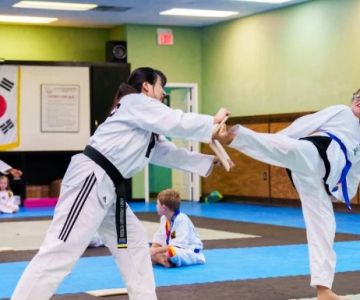

 Golden Tiger Tae Kwon Do5.0 (37 reviews)
Golden Tiger Tae Kwon Do5.0 (37 reviews) Champions Martial Arts Flushing4.0 (339 reviews)
Champions Martial Arts Flushing4.0 (339 reviews) San Francisco Judo Institute4.0 (17 reviews)
San Francisco Judo Institute4.0 (17 reviews) Eastern Academy of Mixed Martial Arts4.0 (193 reviews)
Eastern Academy of Mixed Martial Arts4.0 (193 reviews) All Star Martial Arts5.0 (3 reviews)
All Star Martial Arts5.0 (3 reviews) Cosens Martial Arts Grand Blanc LLC4.0 (69 reviews)
Cosens Martial Arts Grand Blanc LLC4.0 (69 reviews)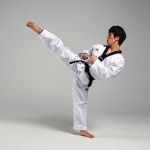 How to Execute a Jumping Roundhouse Kick to the Head
How to Execute a Jumping Roundhouse Kick to the Head How to Execute a Double Kick Combination in Sparring
How to Execute a Double Kick Combination in Sparring How to Perform a Flawless Axe Kick: A Step-by-Step Guide
How to Perform a Flawless Axe Kick: A Step-by-Step Guide DIY Tae Kwon Do Training Equipment for Home Practice
DIY Tae Kwon Do Training Equipment for Home Practice How to Increase Your Vertical Jump for Tae Kwon Do Flying Kicks
How to Increase Your Vertical Jump for Tae Kwon Do Flying Kicks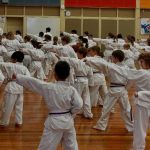 The History of the Tae Kwon Do Peace Corps
The History of the Tae Kwon Do Peace Corps